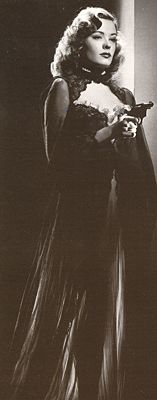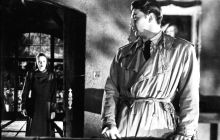FILM NOTES
FILM NOTES INDEX
NYS WRITERS INSTITUTE
HOME PAGE

 Out of the Past
Out of the Past
(American, 1947, 97 minutes, b&w, 16mm)
Directed by Jacques Tourneur
Cast:
Robert Mitchum . . . . . . . . . . Jeff Bailey
Jane Greer . . . . . . . . . . Kathie Moffett
Kirk Douglas . . . . . . . . . .Whit Sterling
Rhonda Fleming . . . . . . . . . . Meta Carson
Richard Webb . . . . . . . . . . Jim
The
following film notes were prepared for the New York State Writers
Institute by Kevin Jack Hagopian, Senior Lecturer in Media Studies
at Pennsylvania State University:
"They say the day you die, your name is written on a cloud."
"Who says?"
"They . . ."
We’re driving slowly through Bridgeport, a tiny burg "down the line," so lost in the Northern California mountains that only a diligent searcher could find it. Yet from the very first, the Fates, or is it the Furies, do come searching for one "Jeff Bailey," filling station owner. Our first view of the landscape, under the credits, is through the windshield of a gangland emissary’s car, and from here on in, whether in the high Sierras or the rain-slicked streets of San Francisco, Jeff's life is hurtling toward some uncanny, violent destiny. Jeff is seeking a weary, secluded happiness with "Ann" (Virginia Huston), out of the way of the forces that boil up out of his past. Jeff’s life, and perhaps his death, is carved on that cloud, etched by a hand he cannot see. In the film’s opening moments, he points to a cove he’d like to settle down in. Then, a summons comes. Lake Tahoe, Mexico City, Acapulco, San Francisco . . . By the end of the film, he will have run everywhere, except home, and Bridgeport will have become an idyll Jeff struggles desperately to recapture, a dream rapidly fading within a nightmare. This is the beginning of OUT OF THE PAST, one of the American studio cinema’s most fully realized works, a film noir so richly imbued with visual style that you may take for granted its humaneness, its profoundly tragic denouement, and its regret that things of the heart can be so completely squandered.
The film’s title is cryptic, perhaps the most emblematic in all of a genre that named its films CRY OF THE CITY, KISS OF DEATH, BETWEEN MIDNIGHT AND DAWN, THE DARK CORNER . . . Nothing in these characters’ pasts ever goes away. Their mistakes are alive, crawling things, and they live with them, with their deadly mistakes, their frauds, betrayals, and murders every day, their handsome faces an album of suspicion and guilt. They trust no one, least of all their allies. "You don’t like to make any mistakes, do you Joe?" asks Jeff of an underworld associate. "They don’t let me have many," says Joe, truthfully.
Everyone in OUT OF THE PAST seems doomed, either by the cruel Fates or by their own tyrannical greed. There is "Kathie Moffat" (Jane Greer), the vixen with a heart of lead; "Whit Sterling" (Kirk Douglas) "the big op" who hires Jeff to get back the one thing he can never really own; "Fisher," (Steve Brodie), "a sort of a stupid, oily gent" who’s somehow gotten to be Jeff’s partner; "Joe Stefanos" (Paul Valentine), the big, likeable gunsel who goes fishing with a .45; "The Kid" (Dick Moore), Jeff’s only real confidant, an expressive, articulate soul, yet made cruelly mute until the moment when Jeff needs him to say what Ann needs to hear. Even bystanders get swept up in Jeff’s headlong journey. Guiltless Ann becomes his accomplice, and a bookkeeper named Eels turns into his namesake. And then there are the small host of film noir characters, the cab drivers and hotel clerks who furnish these frames like so many ugly, comfortable sofas. They are a Greek chorus of the city, loving Jeff for his hopelessness almost as much as we do. "Buddy, you look like a guy who’s in trouble . . . because you don’t act like it," says Jeff’s friend, a basset-faced cabbie, and we know what he means. "I always say everybody’s right," says one of these urban gargoyles, with more equanimity than anyone else, friend or foe, is willing to grant Jeff.
 But it is Jeff himself who mesmerizes us, Jeff in the person of Robert Mitchum. Big, sad-eyed Mitchum, Mitchum of the wide, rolling gait and the aged, friendly trenchcoat, Mitchum whose face always looks as if it were in mourning. Mitchum’s often expressed disdain for acting was a ruse; watch how he inflects the tiniest moment with ironic longing, or the way he makes smoking a cigarette into any one of a dozen different punctuations, or just watch the way he watches. This is one of the screen’s great leading men in one of his best roles, underappreciated and taken for granted, just as he preferred it.
But it is Jeff himself who mesmerizes us, Jeff in the person of Robert Mitchum. Big, sad-eyed Mitchum, Mitchum of the wide, rolling gait and the aged, friendly trenchcoat, Mitchum whose face always looks as if it were in mourning. Mitchum’s often expressed disdain for acting was a ruse; watch how he inflects the tiniest moment with ironic longing, or the way he makes smoking a cigarette into any one of a dozen different punctuations, or just watch the way he watches. This is one of the screen’s great leading men in one of his best roles, underappreciated and taken for granted, just as he preferred it.
Of all the great 40s noir heroes, Bogart, Ladd, Dick Powell, Robert Ryan, Lancaster, and the rest, only Mitchum’s resume reads as if he might have been one of film noir’s fictional drifters and jacks-of-all trades. His father had been killed in a freightyard accident when he was a boy, and Mitchum had gypsied about the country throughout the Depression. He’d been an engine wiper on a tramp steamer, a bouncer at a clip joint, even a low-rent con man. There was even a rumor was that he’d written an oratorio performed at the Hollywood Bowl for China War relief, and another that he’d served time on a chain gang. He left his job as a drop hammer operator at a California Lockheed aircraft plant to do amateur theater, and wandered into movies. As a screen actor, he apprenticed in Hopalong Cassidy Westerns, and then moved up to memorable turns in THE STORY OF G.I. JOE, WHEN STRANGERS MARRY, and THE LOCKET. By 1946, he was already one of RKO’s most dependable male stars. Paradoxically tough and vulnerable, Mitchum brought both men and women into theaters.
For all his strength, Mitchum seems perpetually wounded in OUT OF THE PAST. Kathie Moffat is a blade jammed between his ribs and broken off at the hilt, a part of him in ways he can’t seem to understand. "We seemed to live by night," he says, shrugging off the title of another brilliant RKO film noir, and their love takes place in the moments they steal from Whit, from Fisher, and from the law. This is mad love, l’amour fou, a killing love. No matter to Jeff, who’d forsake everything, job, honor, safety, for Kathy, in a glorious instant of existential divestment: "everything else was just a stone you sailed at the sea."
OUT OF THE PAST was no happy accident, and it was certainly no "B" picture, as historians have foolishly claimed. Director Jacques Tourneur and cinematographer Nicholas Musuraca had gotten their training in RKO studios’ remarkable Val Lewton unit, where their stylish horror films, produced on infinitesimal budgets and based on literary classics like Jane Eyre had won the admiration of the nation’s best critics, and gained the opportunity to put their ideas on a larger, even more complex canvas. They made the most of OUT OF THE PAST’s comparatively lavish budget, studio time, and location shooting opportunities. In particular, Tourneur and Musuraca integrated performers into an evocative, even baroque mise-en-scene. Places such as Kathie and Jeff’s mountain hideout and the Sterling Club become expressionistic nightscapes, lairs for the forces that wait to trap Jeff at every turn. Sequences such as Jeff and Kathie’s sexual rendezvous at her place in Acapulco are so exquisite you surrender to the sheer joy of looking at the incredible range of grays, the mysterious, even erotic sweeping camera movement, the tunnel of light made by the small lamp . . . Throughout, film noir’s trademark shadows are splashed over Jeff like a deadly visual benediction. Characters arise out of dark corners, and then return, as if they live there.
 The team worked from a script by Daniel Mainwaring, who had written the film’s source novel, Build My Gallows High, under his pseudonym, Geoffrey Homes. Mainwaring admitted later that his novel was a slavish imitation of Dashiell Hammett’s The Maltese Falcon. For the film version, RKO toyed with the idea of obtaining Bogart from Warners to play the lead. Luckily, the deal never gelled, and the film was rebuilt around Robert Mitchum’s morose affinity for tragedy, rather than Bogart’s lighter touch. Mainwaring is responsible for the film’s gorgeous wordiness, its fetish for epigrams, which Mitchum presents as if each were his own epitaph. "The day went away, like a pack of cigarettes you smoked." . . . "I build my gallows high, baby." . . . "If I’m going to die, I want to die last."
The team worked from a script by Daniel Mainwaring, who had written the film’s source novel, Build My Gallows High, under his pseudonym, Geoffrey Homes. Mainwaring admitted later that his novel was a slavish imitation of Dashiell Hammett’s The Maltese Falcon. For the film version, RKO toyed with the idea of obtaining Bogart from Warners to play the lead. Luckily, the deal never gelled, and the film was rebuilt around Robert Mitchum’s morose affinity for tragedy, rather than Bogart’s lighter touch. Mainwaring is responsible for the film’s gorgeous wordiness, its fetish for epigrams, which Mitchum presents as if each were his own epitaph. "The day went away, like a pack of cigarettes you smoked." . . . "I build my gallows high, baby." . . . "If I’m going to die, I want to die last."
OUT OF THE PAST appeared in 1946. Hollywood couldn’t know it, but that year was its high-water mark. Television and a host of other troubles would begin eating the movies’ audience away the very next year. It was an unlikely time for the dark forebodings of film noir. As the nation got started forgetting the horrors it had seen at Iwo Jima and Bataan, at Normandy and over Hamburg, and penultimately, at Dachau and Dresden and Hiroshima and a dozen other hells, the movies suddenly seemed as if they wanted to remember the unforgettable with special clarity and care. THE BEST YEARS OF OUR LIVES, IT’S A WONDERFUL LIFE, THE STRANGER, OUT OF THE PAST and a dozen other films produced in what was supposed to be the American jubilee year of 1946 each seemed like the skeleton at the feast. What was it that OUT OF THE PAST really wanted its viewers to remember? That all was not as it seemed, even when it seemed right and just? That what is loved today is despised tomorrow? And that what is despised may come eventually to possess us? What, in fact, claimed Jeff from out of his past? Can our past claim us, as well? Jeff’s search for meaning goes on, even after the movie ends, now entrusted to us. It is a precious but unwanted gift, a burden even, this quest for love in a world that seems constantly to disallow it.
— Kevin Hagopian, Penn State University
For additional information, contact the Writers Institute at 518-442-5620 or online at https://www.albany.edu/writers-inst.